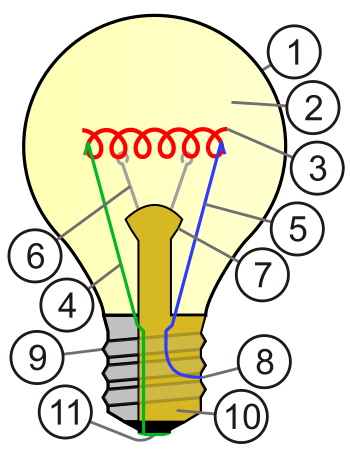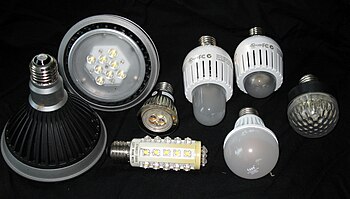Did you know that lighting costs account for about 25% of the average American's energy bill? That cost, when multiplied over a year, becomes an astronomical figure!
CFL and LED light bulbs have helped change that. Using energy saving technology, you can reduce your energy bill by 1/3rd to 1/25th of your original lighting costs.
Though LED lights used to be incredibly expensive, breakthroughs over the last few years have brought their cost down dramatically. Today, they're a better value than both CFL and everyday light bulbs.
Here are some of the many benefits of energy-efficient LEDs.
- Generates Twenty Times Less Heat
 |
| Diagram showing the major parts of a modern incandescent light bulb. (Photo credit: Wikipedia) |
In addition, many Americans then have to spend even more electricity to cool their homes in part because of the heat generated from light bulbs.
LEDs on the other hand generate almost no heat - twenty times less than a standard light bulb.
- Much Longer Lasting
An LED light on the other hand has no filament. As a result, they last much longer.
A good LED light can last as much as ten times longer than the average light bulb.
- Reduced Lifetime Costs
An LED light on the other hand costs more upfront, but conserves a lot more energy in the long run.
In terms of total dollars invested over its lifetime, LED lights are a better value than standard light bulbs and even CFL light bulbs.
- Better for the Environment
The chemical waste problem is compounded by the sheer volume of light bulbs that need to be produced.
 |
| A selection of commercially available LED light bulbs. (Photo credit: Wikipedia) |
CFLs last a lot longer than standard florescent light bulbs, but they still contain mercury - in even slightly higher amounts.
LED lights are much better for the environment, because no mercury is used in the production process. You also need to replace them much less often, which means less waste.
These are some of the many benefits of energy-efficient LEDs.
And replacing the light bulbs in your home is as easy as noting the wattage and going down to your local hardware store to buy LED lights.
There are quite a few choices you can choose from. You can get diffused bulbs, which take the concentrated light and turn it into a more spread out kind of light. You can get high power diffused, which are similar to 100 watt standard bulbs. You can also get them in track lighting, spotlight and floodlight forms.
Hi
ReplyDeleteI like your blog. I google+ it and linked to ya on mine. But, you could make it easier for someone new by add a sitemap page (a page with all the post titles that are linked to the post.)
think about it
Keep Smiling
reuben